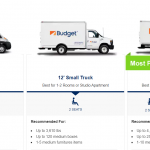Moving to a new home is an exciting journey, but calculating moving costs can be daunting. If you’re planning a move in the vibrant city of Seattle, understanding the average moving expenses can help you budget accordingly.
This article explores the average costs of local and long-distance moves in Seattle, factors impacting moving costs, essential questions to ask potential movers, and tips for reducing expenses.
Average Cost of Movers for Local Moves in Seattle
Local moves within Seattle involve short distances, but the costs can still vary based on factors like the size of your home, the number of movers required, and the time taken to complete the move.
| Home Size | Average Total Cost | Cost Per Hour | Number of Movers |
| Studio | $240-$400 | $80-$100 | 2 |
| 1 Bedroom | $300-$500 | $80-$100 | 2 |
| 2 Bedrooms | $400-$600 | $90-$120 | 3 |
| 3 Bedrooms | $800-$1,000 | $100-$150 | 4 |
| 4 Bedrooms | $1,000-$1,500 | $100-$150 | 5 |
Average Seattle Movers Cost for Long-Distance Moves
For those moving long distances to or from Seattle, the moving expenses become more complex due to additional factors like the distance of the move. If you move across the country, these numbers can significantly increase.
| Home Size | Distance | Total Cost | Number of Movers |
| 1 Bedroom | Under 500 miles | $1,200-$2,500 | 2 |
| 1 Bedroom | 500-1,000 miles | $1,500-$3,000 | 2 |
| 2 Bedrooms | Under 500 miles | $2,500-$3,500 | 3 |
| 2 Bedrooms | 500-1,000 miles | $3,000-$4,500 | 3 |
| 3 Bedrooms | Under 500 miles | $3,500-$5,000 | 4 |
| 3 Bedrooms | 500-1,000 miles | $4,000-$6,000 | 4 |
What Impacts Moving Costs in Seattle?
Similar to NYC moving costs, many factors can also impact your Seattle movers cost.
Size of Your Home
The size of your home has a significant impact on moving costs. The larger your home, the more belongings you may have. The cost to move a four-bedroom home will cost more than a two-bedroom home. Here are some ways in which the size of your home influences moving costs:
Amount of Belongings: The size of your home directly correlates with the number of belongings you need to move. Larger homes typically have more furniture, appliances, boxes, and personal items so more items will be packed, loaded, and transported.
A great way to save money on the overall cost of your move is to get rid of any junk you don’t need. That’s why we’ve partnered with 1-800-GOT-JUNK to help you save money. Use code AGOYU5 to save 5% on junk removal!
Time Required: Moving a larger home typically takes longer than moving a smaller one. The distance between the old and new home, traffic conditions, and the complexity of the move can also affect the time required.
Number of Movers
The number of movers directly influences moving costs, and it plays a crucial role in determining the efficiency and speed of the moving process. Here’s how the number of movers impacts moving costs:
Efficiency and Speed: The more movers you have, the faster and more efficiently they can load and unload the moving truck. With a larger crew, the moving process can be completed in less time, reducing labor costs and minimizing the time required for the move.
Labor Costs: Moving companies typically charge an hourly rate for their services, and the number of movers needed directly affects the total labor cost. More movers working together can complete the job faster, lowering labor costs. Conversely, fewer movers might take longer to finish the move, resulting in higher labor expenses.
Assistance with Packing and Unpacking
Packing and unpacking assistance can significantly impact Seattle moving company rates. Here’s how packing and unpacking assistance can influence the overall moving cost:
Additional Labor: Moving companies typically charge for their services based on the number of hours and the number of movers required. If you opt for packing and unpacking assistance, the moving company will send a team of professionals to handle these tasks.
Packing Materials: When the moving company provides packing services, they will also supply the necessary packing materials, such as boxes, tape, bubble wrap, and packing paper. These materials will be included in the moving cost, adding to the overall expenses.
Unpacking Services: If you add unpacking services to your moving package, the movers will not only unload the boxes at your new home but also help you unpack and arrange your belongings. This service can be convenient but also add to the overall moving cost.
Need Movers? Your Move, Your Choice

Instant Exact Cost for Your Specific Move
Agoyu’s AI technology give you quick, precise estimates. Scan your room, receive instant quotes from multiple movers, and confidently select the best option for you.
STEP 1 OF 3
or Have a Top Mover Call Me Now!
Do it the old fashion way! A top mover will call you to provide an instant quote over the phone or at your house!
Materials
Packing materials can have a notable impact on moving costs in Seattle. The type and quantity of packing materials required depend on the size of your move, the fragility of your belongings, and whether you choose to pack your items yourself or hire professional packers. Here’s how packing materials impact moving costs:
Cost of Materials: The cost of packing materials can vary based on the type and quality of the items you need. Common packing materials include cardboard boxes, packing paper, bubble wrap, packing peanuts, tape, and furniture blankets. The more items you have and the more delicate they are, the higher the cost of purchasing these materials.
Insurance
Insurance with a moving company can impact moving costs in several ways. It protects your belongings during the move, giving you peace of mind in case of any damage or loss. This is how insurance can influence moving costs:
Basic Liability Coverage: Most moving companies include basic liability coverage as part of their standard services. This coverage is usually based on the weight of your belongings and provides minimal protection, typically offering only a few cents per pound for damaged or lost items.
Full-Value Protection: Full-value protection is a more comprehensive insurance option that provides better coverage for your belongings. With this type of insurance, the moving company is responsible for repairing or replacing damaged items or compensating you for their current market value.
The price for full-value protection is typically based on the declared value of your belongings, usually a percentage per $1,000.
Additional Insurance Options: Some moving companies may offer additional insurance options, such as extended valuation coverage or third-party insurance. These additional coverage choices may have higher premiums, impacting the overall moving cost.
Storage Fees
Storage fees can impact moving costs when you require temporary storage for your belongings during the moving process. Here’s how storage fees can influence moving costs:
Storage Facility Rental: The primary cost associated with storage is the rental fee for the storage unit. The unit size will depend on the volume of items you need to store, and larger units generally come with higher rental costs.
Storage Duration: The time you need to store your belongings will impact the cost. Longer storage periods will result in higher fees than shorter storage durations.
Accessibility: Some storage facilities offer 24/7 or extended access hours, but these conveniences might come with higher rental fees than facilities with limited access hours.
Moving Date
The moving date can significantly impact moving costs due to supply and demand fluctuations in the moving industry. Here’s how the moving date can influence moving costs:
Peak Season vs. Off-Peak Season: The moving industry experiences peak seasons, typically during the summer when many people prefer to move due to better weather and school vacations. During peak season, moving companies are in high demand, which can result in higher moving costs.
Month and Week: Your move’s specific month and week can also affect costs. The beginning and end of the month are usually busier for moving companies due to lease and rental agreements’ typical start and end dates. Consider moving mid-month or during less busy weeks to secure lower flatrates for movers Seattle.
Day of the Week: The day you move can also impact costs. Weekends and Fridays are typically busier days for moving companies, so they may charge higher rates for these days. Consider moving on a weekday, such as Monday through Thursday, to save on moving costs.
Specialty Items
Specialty items can significantly impact moving costs due to their unique characteristics that require specialized handling and additional resources. Special items are possessions that demand extra care, expertise, and sometimes special equipment to ensure safe transportation during a move, such as pianos, pool tables, artwork, or antiques.
Special Handling: Moving specialty items requires specific handling techniques to prevent damage during transit. Movers may need to use custom crating, protective padding, or disassembling and reassembling things, which can increase labor costs.
Additional Labor: Moving specialty items often requires more labor than regular household items. Movers may need extra staffing to lift, carry, and load these heavy or bulky items onto the moving truck, leading to higher labor expenses.
Vehicle Transport
Transporting a vehicle as part of your move can add significant costs. The cost depends on several factors:
Distance of the Move: Similar to moving household goods, the longer the distance, the higher the cost of moving a vehicle.
Size and Weight of the Vehicle: Larger and heavier vehicles, such as SUVs or trucks, generally cost more to transport than smaller cars due to their impact on fuel consumption and the extra space they occupy on the transport trailer.
Type of Transport: There are two main types of transport: open transport and enclosed transport. Open transport, which exposes your car to the elements, is less expensive. Enclosed transport, which protects your vehicle from the weather and road debris, is typically around 50% more expensive.
Seattle Movers Cost: FAQs
How much do movers cost in Seattle?
The cost varies significantly based on the size of your home, the distance of your move, and various other factors. A local move could cost anywhere from $240 to $1,500, while a long-distance move could range from $1,200 to $6,000.
What is the cheapest day to hire movers?
Generally, weekdays during the off-peak season (fall and winter) can be cheaper because demand is lower.
What are the best ways to cut costs when moving in Seattle?
To save money, consider moving during off-peak times, getting multiple quotes, decluttering before moving, and packing yourself.
Final Thoughts
While moving in Seattle can be expensive, understanding the costs can help you budget effectively and save money. Be sure to ask your movers plenty of questions, understand all the fees involved, and consider what services are necessary for your move. With careful planning, your move can be less stressful and more efficient.
Using the Agoyu moving app can help you compare the cost of some of the best moving companies, and you can read mover reviews. Check out the Agoyu app today to start planning your move in Seattle!





